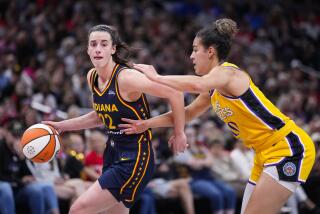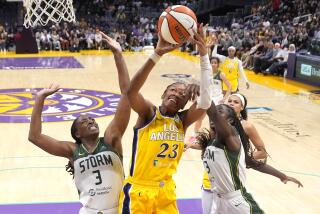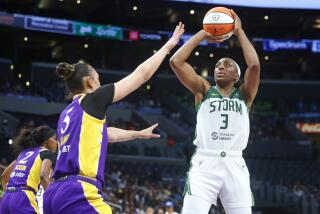Added Spark
Six years ago Mwadi Mabika stood among 299 other hopefuls during a public tryout by the Sparks wondering if she could catch someone’s eye.
Six years later, she is a WNBA star and is the defending champions’ most important player after Lisa Leslie.
A graceful and explosive athlete, Mabika, 26, has reached a level of performance this season equal to the potential Sparks’ officials saw in 1997.
She leads the team in scoring at 17.2 points a game, and ranks third overall in the WNBA. Mabika is shooting 42.8% from the field (36.7% from three-point range) and 82.7% from the free-throw line.
Her scoring average is almost five points higher than her previous best (12.3 in 2000) and six points better than last year. She has been the Sparks’ top scorer in 15 of 30 games.
As the regular season dwindles to its final games and the Sparks battle the Houston Comets for the league’s best record, Mabika has been at her best when it counts the most. In the last 13 games, she has averaged 20.2 points, including 32 points against Portland on July 12.
It makes Mabika a leading candidate for the league’s most improved player award, along with New York’s Tamika Whitmore and Orlando’s Shannon Johnson.
“She is becoming a complete player,” Spark General Manager Penny Toler said. “The last two years, she has learned the game a lot more. She’s learned she has take-over-the-game capabilities. She’s taking good shots and taking the tough shots [with the game on the line].
“She’s realized there are not too many players who can go up with her.”
A 5-foot-11, 165-pound guard, Mabika regularly confounds defenders with the speed to drive past them to the basket, or leap above them for jump shots. Defensively, her quick hands and feet have accounted for 37 steals and nine blocks.
More importantly, after spending the summer working with Coach Michael Cooper and playing pickup games with Magic Johnson’s traveling team, Mabika has the confidence that she is an elite player.
“Coop has been telling me to take big shots this year, telling me to be a leader on this team,” Mabika said. “And he worked with me and prepared me to be a leader on this team during the off-season.”
She had been a top player in Europe, but the Sparks are Leslie’s team. There are also such strong personalities as Latasha Byears, DeLisha Milton and Tamecka Dixon, who don’t require any rah-rah types to get them motivated.
Which makes the quiet Mabika, who made her second All-Star team this season, a perfect leader by example. She will speak when she has something to say but prefers to let her game do the talking. This season it speaks loudly.
“I know how to do that, to take a big shot,” Mabika said. “I took that attitude from over there [in Europe], and brought it over here.”
Her teammates are quite happy for Mabika’s breakout year.
“I think she’s always been a go-to player. But she had to get comfortable with it [pressure],” Dixon said. “She’s taken big shots as long as I can remember, even when she wasn’t scoring as many points. But [last winter] she worked on her moves with Cooper and Lisa. That added more confidence. That’s why things have come together.”
Still, it might have been hard for Mabika to envision this level of success as a child.
Born in Kinshasa, Zaire (now the Congo), in central Africa, the daughter of a physician, Mabika started playing basketball with her brothers on a neighborhood outdoor court. She said she would watch tapes of NBA games broadcast on local television and would try to imitate the moves of players like Johnson, Michael Jordan and Clyde Drexler.
By 12, Mabika had learned enough to join a Zairian Division III team. In 1996 Mabika, then 19, scored 20 points against the U.S. while playing for Africa in the Atlanta Olympics. She was encouraged to come back and try out for the WNBA, which would be starting the next year.
Mabika had to return to Zaire, however, and didn’t know if she would be allowed to go back to the U.S. NBA star Dikembe Mutombo, a native of Kinshasa, heard about her situation and personally appealed to government officials, deeply involved in a civil war, to let Mabika leave the country.
Despite the death of her father (due to complications of diabetes) and speaking no English, Mabika came to Los Angeles in 1997 for the Spark tryout.
Toler, a Spark player in 1997, was at the tryout. She said Mabika easily stood out.
“There were 300 players there and about 250 were garbage. That’s one reason why Mike and I hold invitation-only tryouts now,” Toler said. “Mwadi wasn’t polished, but you saw a real athlete--somebody who ran the floor real well, could jump out of the gym, and there’s no difference in her jump shot now than six years ago. She always had the prettiest jump shot in the game.”
Now she is a driving force in L.A.’s effort to repeat as WNBA champion. If the Sparks can win the title again, Mabika said it would mean more to her than last year’s championship.
“The second one would be the best because it is tough to win back-to-back,” Mabika said.
“That’s why we have to stay focused and keep believing we can do it.”
*
(BEGIN TEXT OF INFOBOX)
*--* Getting Better All the Time A relatively unknown 21-year-old from the Congo when she tried out for the Sparks in 1997, Mwadi Mabika has steadily developed into an All-Star: Year G MPG FG Pct FT Pct RPG APG PPG 1997 21 15.5 390 542 2.6 1.0 6.0 1998 29 24.5 339 698 4.4 1.5 8.2 1999 32 29.0 372 718 4.8 3.5 10.8 2000 32 29.1 388 820 5.6 3.1 12.3 2001 28 29.6 387 861 4.6 3.1 11.2 2002 30 32.7 428 827 5.2 2.9 17.2
Totals 172 27.5 387 783 4.7 2.6 11.2
*--*


